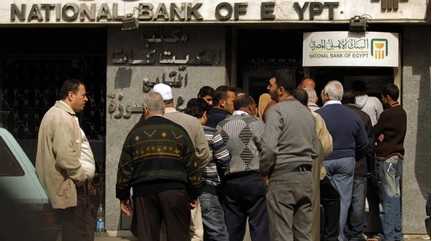
24 Jan 2022; MEMO: Egyptians are crowding into banks after rumours spread that the central bank will float the Egyptian pound again.
In 2016 Egypt floated its currency in a move the central bank said was part of a list of reforms to strengthen the economy in exchange for a $12 billion IMF loan.
As part of the programme Cairo was expected to devalue the pound and unpeg its currency from the dollar.
However, the move increased hardship in the country, reduced the value of the Egyptian pound and inflation soared.
According to a report by Al-Araby Al-Jadeed, customers argued with staff at the Commercial International Bank in downtown Cairo over the weekend because they were struggling to withdraw money from the ATM machines.
The central bank has set the limit for daily withdrawals from individual accounts inside branches at 50,000 Egyptian pounds ($3,175) and 70,000 Egyptian pounds ($4,445) from ATMs.
Since 13 January customers have struggled to receive bank transfers after being told that banks can't update their computer systems.
After reports circulated about the crisis last week, the Egyptian government sent instructions to the media not to report on the queues outside banks or that the pound was being floated.
They asked instead that newspapers report that the banking sector was stable, reports Al-Araby Al-Jadeed.
Egypt is already undergoing an economic crisis with the price of food and fuel rising and living conditions becoming increasingly unmanageable particularly after subsidies were slashed.
Foreign currency earnings including from tourism and foreign investment have been declining since 2011, when Egyptians toppled Hosni Mubarak, and have been exacerbated by the 2013 coup and the global coronavirus pandemic.
Some 60 per cent of Egypt's population is either poor or vulnerable.
President Abdel Fattah Al-Sisi has tried to whitewash fears over the economy by asking Egyptians to be patient.
His critics have pointed out how corruption among top regime officials have added to the country's economic woes and in 2019 took to the streets to demand that he stand down.
Poor living conditions, which meant some Egyptians could not afford to buy bread, was one of the reasons Egyptians took to the streets during the January 2011 uprising.




